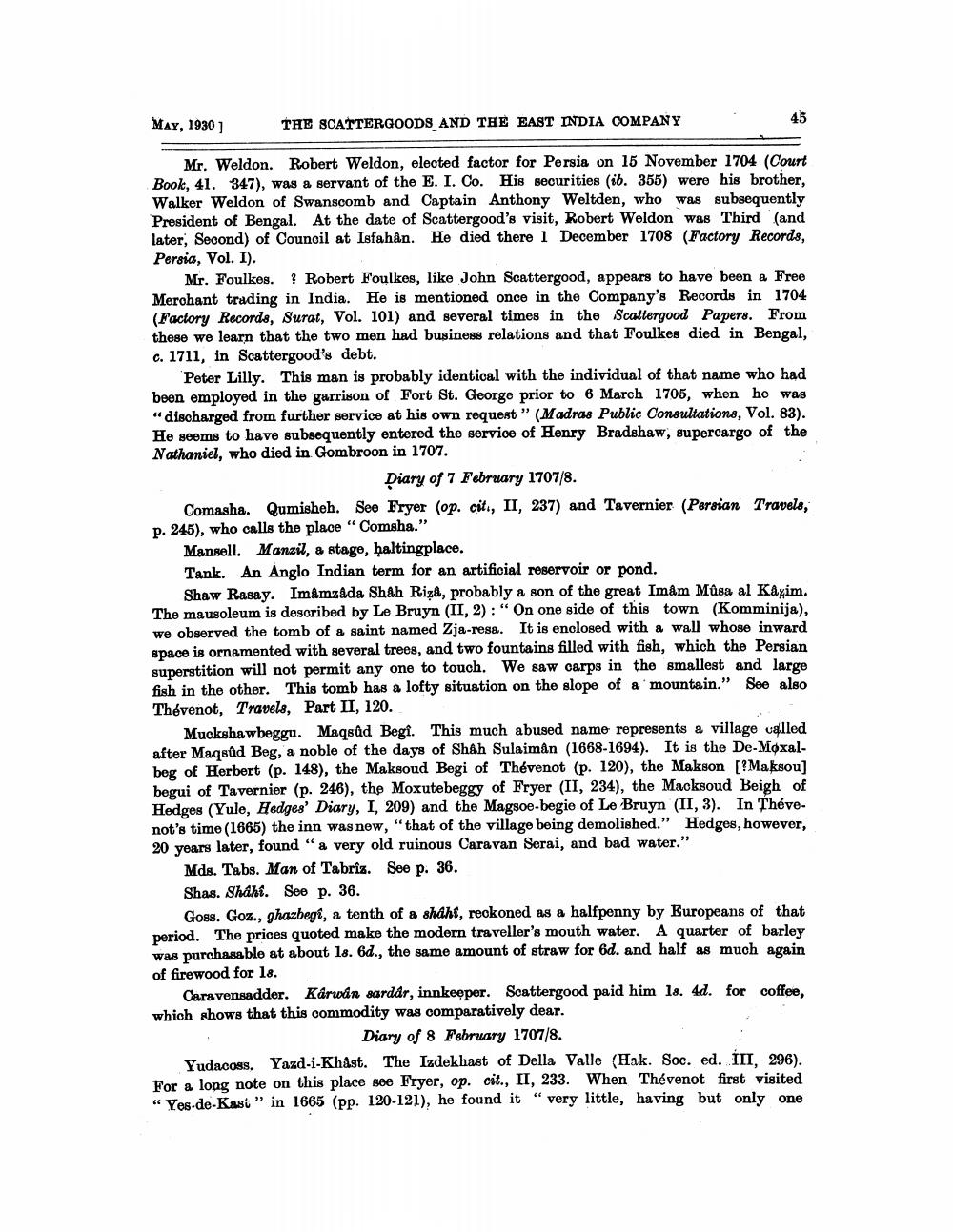________________
MAY, 1930
THE SCATTERGOODS AND THE EAST INDIA COMPANY
45
Mr. Weldon. Robert Weldon, elected factor for Persia on 15 November 1704 (Court Book, 41. 347), was a servant of the E. I. Co. His securities (ib. 355) were his brother, Walker Weldon of Swanscomb and Captain Anthony Weltden, who was subsequently President of Bengal. At the date of Scattergood's visit, Robert Weldon was Third (and later, Second) of Council at Isfahân. He died there 1 December 1708 (Factory Records, Persia, Vol. I).
Mr. Foulkes. ? Robert Foulkes, like John Scattergood, appears to have been a Free Merchant trading in India. He is mentioned once in the Company's Records in 1704 (Factory Records, Surat, Vol. 101) and several times in the Scattergood Papers. From these we learn that the two men had business relations and that Foulkes died in Bengal, c. 1711, in Scattergood's debt.
Peter Lilly. This man is probably identical with the individual of that name who had been employed in the garrison of Fort St. George prior to 6 March 1705, when he was "discharged from further service at his own request" (Madras Public Consultations, Vol. 83). He seems to have subsequently entered the service of Henry Bradshaw, supercargo of the Nathaniel, who died in Gombroon in 1707.
Diary of 7 February 1707/8. Comasha. Qumisheh. See Fryer (op. cit., II, 237) and Tavernier (Persian Travels, p. 245), who calls the place “Comaha."
Mansell. Manzil, a stage, haltingplace. Tank. An Anglo Indian term for an artificial reservoir or pond.
Shaw Ragay. Imamzada Shah Riza, probably a son of the great Imam Mûsa al Kazim. The mausoleum is described by Le Bruyn (II, 2): "On one side of this town (Komminija), we observed the tomb of a saint named Zja-resa. It is enclosed with a wall whose inward space is ornamented with several trees, and two fountains filled with fish, which the Persian superstition will not permit any one to touch. We saw carps in the smallest and large fish in the other. This tomb has a lofty situation on the slope of a mountain." See also Thévenot, Travels, Part II, 120.
Muckshawbeggu. Maqsûd Begi. This much abused name represents a village velled after Maqsûd Beg, a noble of the days of Shah Sulaiman (1668-1694). It is the De-Moxalbeg of Herbert (p. 148), the Maksoud Begi of Thévenot (p. 120), the Makson [?Maksou] begui of Tavernier (p. 246), the Moxutebeggy of Fryer (II, 234), the Macksoud Beigh of Hedges (Yule, Hedges' Diary, I, 209) and the Magsoe-begie of Le Bruyn (II, 3). In Thévenot's time (1665) the inn was new, "that of the village being demolished." Hedges, however, 20 years later, found "a very old ruinous Caravan Serai, and bad water."
Mds. Tabs. Man of Tabriz. See p. 36. Shas. Shahi. See p. 36.
Goss. Goz., ghazbegi, a tenth of a sháhf, reckoned as a halfpenny by Europeans of that period. The prices quoted make the modern traveller's mouth water. A quarter of barley was purchasable at about 18. 6d., the same amount of straw for 6d. and half as much again of firewood for 18.
Caravensadder. Karwán sardár, innkeeper. Scattergood paid him 18. 4d. for coffee, which shows that this commodity was comparatively dear.
Diary of 8 February 1707/8. Yudacoss. Yazd-i-Khåst. The Izdekhast of Della Valle (Hak. Soc. ed. III, 296). For a long note on this place see Fryer, op. cit., II, 233. When Thévenot first visited “ Yes-de-Kast” in 1665 (pp. 120-121), he found it "very little, having but only one




